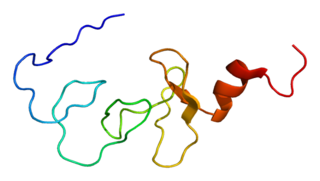UMP-CMP kinase is an enzyme that in humans is encoded by the CMPK1 gene. [5] [6]
UMP-CMP kinase is an enzyme that in humans is encoded by the CMPK1 gene. [5] [6]
Uridine monophosphate (UMP)/cytidine monophosphate (CMP) kinase (EC 2.7.4.4) catalyzes the phosphoryl transfer from ATP to UMP, CMP, and deoxy-CMP (dCMP), resulting in the formation of ADP and the corresponding nucleoside diphosphate. These nucleoside diphosphates are required for cellular nucleic acid synthesis. [6] [7]

Deoxycytidine is a deoxyribonucleoside, a component of deoxyribonucleic acid. It is similar to the ribonucleoside cytidine, but with one hydroxyl group removed from the C2' position.

A cyclic nucleotide (cNMP) is a single-phosphate nucleotide with a cyclic bond arrangement between the sugar and phosphate groups. Like other nucleotides, cyclic nucleotides are composed of three functional groups: a sugar, a nitrogenous base, and a single phosphate group. As can be seen in the cyclic adenosine monophosphate (cAMP) and cyclic guanosine monophosphate (cGMP) images, the 'cyclic' portion consists of two bonds between the phosphate group and the 3' and 5' hydroxyl groups of the sugar, very often a ribose.
A salvage pathway is a pathway in which a biological product is produced from intermediates in the degradative pathway of its own or a similar substance. The term often refers to nucleotide salvage in particular, in which nucleotides are synthesized from intermediates in their degradative pathway.

Deoxycytidine kinase (dCK) is an enzyme which is encoded by the DCK gene in humans. dCK predominantly phosphorylates deoxycytidine (dC) and converts dC into deoxycytidine monophosphate. dCK catalyzes one of the initial steps in the nucleoside salvage pathway and has the potential to phosphorylate other preformed nucleosides, specifically deoxyadenosine (dA) and deoxyguanosine (dG), and convert them into their monophosphate forms. There has been recent biomedical research interest in investigating dCK's potential as a therapeutic target for different types of cancer.

Casein kinase II subunit alpha is an enzyme that in humans is encoded by the CSNK2A1 gene.

Casein kinase II subunit alpha' is an enzyme that in humans is encoded by the CSNK2A2 gene.

Calcium/calmodulin-dependent protein kinase type IV is an enzyme that in humans is encoded by the CAMK4 gene.
In enzymology, a cytidylate kinase is an enzyme that catalyzes the chemical reaction

Activating transcription factor 2, also known as ATF2, is a protein that, in humans, is encoded by the ATF2 gene.

Serine/threonine-protein kinase D1 is an enzyme that in humans is encoded by the PRKD1 gene.

Phosphatidylethanolamine-binding protein 1 is a protein that in humans is encoded by the PEBP1 gene.

LIM domain kinase 2 is an enzyme that in humans is encoded by the LIMK2 gene.

Thioredoxin-dependent peroxide reductase, mitochondrial is an enzyme that in humans is encoded by the PRDX3 gene. It is a member of the peroxiredoxin family of antioxidant enzymes.

Uridine-cytidine kinase 2 (UCK2) is an enzyme that in humans is encoded by the UCK2 gene.

Serine/threonine-protein kinase MRCK alpha is an enzyme that in humans is encoded by the CDC42BPA gene.

Endoplasmic reticulum protein 29 (ERp29) is a chaperone protein that in humans is encoded by the ERP29 gene.

N-acylneuraminate cytidylyltransferase is an enzyme that in humans is encoded by the CMAS gene.

Dual specificity testis-specific protein kinase 1 is an enzyme that in humans is encoded by the TESK1 gene.

Dual specificity testis-specific protein kinase 2 is an enzyme that in humans is encoded by the TESK2 gene.
(d)CMP kinase is an enzyme with systematic name ATP:(d)CMP phosphotransferase. This enzyme catalyses the following chemical reaction